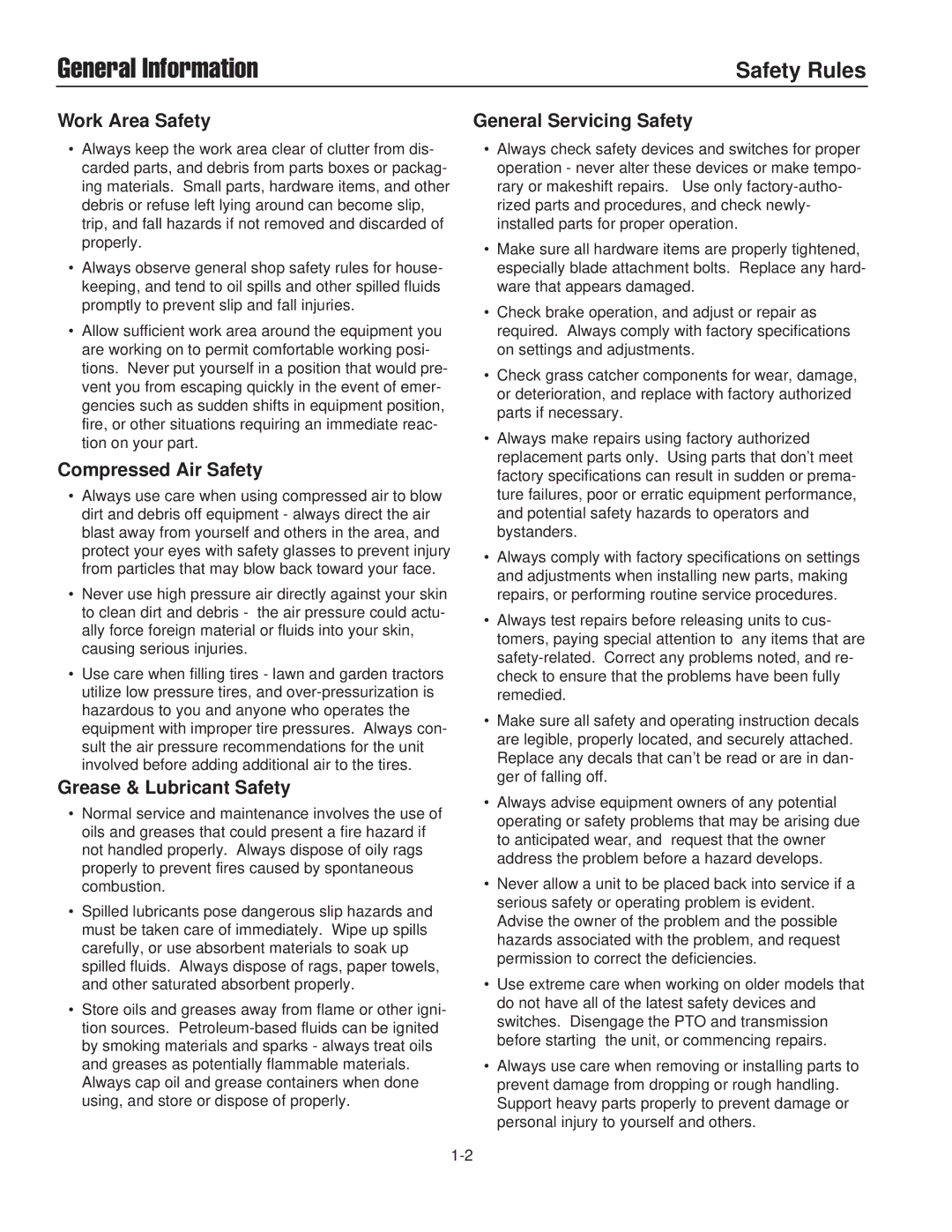General Information | Safety Rules |
Work Area Safety | General Servicing Safety |
•Always keep the work area clear of clutter from dis- carded parts, and debris from parts boxes or packag- ing materials. Small parts, hardware items, and other debris or refuse left lying around can become slip, trip, and fall hazards if not removed and discarded of properly.
•Always observe general shop safety rules for house- keeping, and tend to oil spills and other spilled fluids promptly to prevent slip and fall injuries.
•Allow sufficient work area around the equipment you are working on to permit comfortable working posi- tions. Never put yourself in a position that would pre- vent you from escaping quickly in the event of emer- gencies such as sudden shifts in equipment position, fire, or other situations requiring an immediate reac- tion on your part.
Compressed Air Safety
•Always use care when using compressed air to blow dirt and debris off equipment - always direct the air blast away from yourself and others in the area, and protect your eyes with safety glasses to prevent injury from particles that may blow back toward your face.
•Never use high pressure air directly against your skin to clean dirt and debris - the air pressure could actu- ally force foreign material or fluids into your skin, causing serious injuries.
•Use care when filling tires - lawn and garden tractors utilize low pressure tires, and
Grease & Lubricant Safety
•Normal service and maintenance involves the use of oils and greases that could present a fire hazard if not handled properly. Always dispose of oily rags properly to prevent fires caused by spontaneous combustion.
•Spilled lubricants pose dangerous slip hazards and must be taken care of immediately. Wipe up spills carefully, or use absorbent materials to soak up spilled fluids. Always dispose of rags, paper towels, and other saturated absorbent properly.
•Store oils and greases away from flame or other igni- tion sources.
•Always check safety devices and switches for proper operation - never alter these devices or make tempo- rary or makeshift repairs. Use only
•Make sure all hardware items are properly tightened, especially blade attachment bolts. Replace any hard- ware that appears damaged.
•Check brake operation, and adjust or repair as required. Always comply with factory specifications on settings and adjustments.
•Check grass catcher components for wear, damage, or deterioration, and replace with factory authorized parts if necessary.
•Always make repairs using factory authorized replacement parts only. Using parts that don’t meet factory specifications can result in sudden or prema- ture failures, poor or erratic equipment performance, and potential safety hazards to operators and bystanders.
•Always comply with factory specifications on settings and adjustments when installing new parts, making repairs, or performing routine service procedures.
•Always test repairs before releasing units to cus- tomers, paying special attention to any items that are
•Make sure all safety and operating instruction decals are legible, properly located, and securely attached. Replace any decals that can’t be read or are in dan- ger of falling off.
•Always advise equipment owners of any potential operating or safety problems that may be arising due to anticipated wear, and request that the owner address the problem before a hazard develops.
•Never allow a unit to be placed back into service if a serious safety or operating problem is evident. Advise the owner of the problem and the possible hazards associated with the problem, and request permission to correct the deficiencies.
•Use extreme care when working on older models that do not have all of the latest safety devices and switches. Disengage the PTO and transmission before starting the unit, or commencing repairs.
•Always use care when removing or installing parts to prevent damage from dropping or rough handling. Support heavy parts properly to prevent damage or personal injury to yourself and others.
